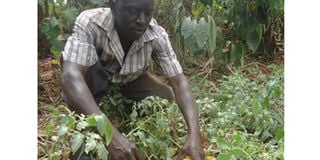Ntege realised higher income from growing tomatoes

Ntege picks ripe tomatoes from his garden. Photo by Fred Muzaale
Fifteen years ago, John Ntege, a resident of Bwetyaba village in Kayunga Sub-county, Kayunga District was growing crops such as maize, sorghum, beans, and potatoes. However, Ntege was not impressed by the income he got after selling these crops. This was because of the low prices for the produce.
“I would sell potatoes and beans to schools and get about Shs400,000 a season,” he says. “This frustrated me and I thought of another crop to grow.”
In 2009, Ntege decided on tomato after he discovered that their demand had gone up after traders started exporting them to Juba in southern Sudan.
From the half acre, Ntege earned about Shs3m from selling to traders from Juba. There were 200 boxes which he sold at Shs150,000 each.
Initially, most of the tomatoes were being sold on the local market. Taking tomatoes to Juba nearly doubled the price for a box of tomatoes from Shs40,000 to Shs80,000.
The other reason was that tomatoes have a short growing period of about three months.
Because he lacked knowledge on tomato growing, he went to a friend to get the training.
During the training, he was told that in order to get a good market he had to plant them in a period when other farmers find it hard to grow them. Such periods, he says, include during long dry spells and heavy rains. “During dry spells, few farmers can afford to water their plants. During heavy rains, a farmer incurs a higher cost in buying pestcides.”
Liked by buyers
“After the training, I started with a half an acre. I started by planting a nursery bed. In the bed, I planted Onyx tomatoes,” he says.
“I chose this variety because it was resistant to diseases and is also liked by buyers because it makes good salad.”
Ntege advises that soil in the nursery bed should be mixed with compost or chicken dropping to increase its fertility. It should also be made fine to enable the small roots to establish. The seedlings will be ready for transplanting after three weeks.
According to Ntege, although it is better to do this during a rainy season, he does it at any time, including during dry seasons.
“During dry periods, I water them until the rains come. I have dug points where I get the water easily,” he says.
Before transplanting, he puts DAP fertiliser in the holes and covers with a thin layer of soil. After this, he plants the seedling, waters them and, when they were about one month old, he mulches the garden to control weeds and to prevent the tomato fruits from getting into direct contact with the soil.
He explains that when the fruits get into contact with the soil, they are easily attacked by nematodes and pests from the soil.
He has expanded the garden to three acres from which he expects to get about Shs50m.
However, he has switched to growing Assila tomato.
This hybrid tomato variety is high yielding, resistant to drought and is liked by traders from Juba because it has a longer shelf life compared to other varieties.
A blessing
Currently, there are few farmers with ripe tomatoes like his, which he says has increased the demand for tomatoes. He hopes his produce will fetch a higher price of about Shs250,000 per box.
But even when the price falls, he continues to grow tomatoes. “When you do a business you don’t expect profits only, and this applies to farming,” he says. “I don’t have to go looking for buyers as the traders come and buy from my garden.”
With proceeds from the tomatoes, Ntege has bought several pieces of land and also constructed commercial buildings in Kayunga and Mukono towns. Also, he pays for his children’s education, some of whom are at university.
The biggest challenge are pests and diseases such as tomato wilt. He says controlling them requires him to dig deep into his pocket to buy the pesticides and fertilisers.
Another challenge he faces is the long dry periods, which requires him to water the plants. However, he says this is a blessing since it is only when he plants during dry periods that he gets a good market for the produce.




